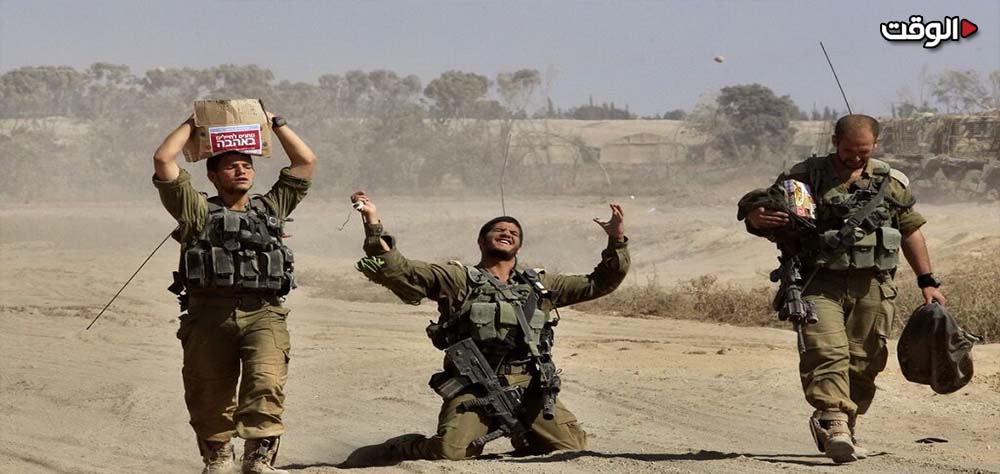Netanyahu is under considerable pressure to halt the Gaza war. In the past week, numerous Zionist citizens have rallied for an end to the conflict and urged Netanyahu to engage in negotiations with Hamas for the release of prisoners. These demands were expressed through large-scale protests held in Kaplan Square, Tel Aviv, and also in the city of Quds (Occupied section).
ALWAGHT- In contrast to media coverage of the continuing Gaza war, there are numerous reports indicating the withdrawal of Zionist military forces from the region. The recent announcement from the "Israeli Army Radio" reveals the regime's intention to give leave to 5 combat brigades. Additionally, according to the Hebrew website "Walla," field developments in Gaza suggest that extra forces called up for duty are anticipated to be granted leave in the upcoming week.
Initiation of Retreat
In the previous week, reports from both Israeli and Palestinian news outlets indicated that Zionist forces, facing challenges in advancing against the resistance attacks in Palestine, withdrew an additional segment of their troops from Gaza. Hayom, an Israeli newspaper, also conveyed the retreat of the Zionist Army's 36th Division from Gaza, encompassing the 6th and 7th Brigades, the 188th Brigade, the Engineering Corps, and units from the Golani Brigade. Zionist sources assert that the 36th Division left Gaza to improve capabilities, undergo training, and bolster its strength. The destination of their transfer is yet to be determined. Following the departure of the 36th Division, only three Israeli Army divisions remain in and around Gaza: the 162nd Brigade poised to attack northern Gaza, the 99th Brigade which occupies a passage that divides Gaza into north and south, and the 98th Brigade tasked to assault Khan Yunis.
Why Retreat?
According to reports from Gaza, despite being heavily armed, the military of the Zionist regime has, after three and a half months of war against Gaza, still not achieved its intended objectives. At the onset of the conflict, the Zionists had announced two goals, namely the destruction of Hamas and the liberation of all their captives held in Gaza. However, none of these objectives have been achieved.
The launching of projectiles by Palestinian resistance forces against occupied areas and settlements continues, and more than 130 Zionist prisoners remain in captivity under Palestinian control. Even Zionist intelligence and security apparatuses have been unsuccessful in locating their captives, leaving Tel Aviv unable to free its prisoners in Gaza. As a result, the failure to achieve these goals emerges as a significant factor in the withdrawal of occupying forces from Gaza.
Internal and External Pressure
However, significant pressure is being exerted on Netanyahu to halt the Gaza war. In the past week, thousands of Zionist citizens participated in numerous large-scale demonstrations in Kaplan Square, Tel Aviv, and the city of Quds, demanding an end to the ongoing conflict in Gaza. They urged Netanyahu to engage in negotiations with Hamas for the release of prisoners.
Internationally, Netanyahu faces substantial pressure due to the escalating human casualties in the Gaza war, surpassing 25,000 martyrs and 7,000 missing. Even the Zionist supporters in Western and European countries believe that supporting Netanyahu in continuing the war in Gaza will come at a high cost for them. Consequently, opposition to the ongoing Gaza war has gained momentum in Europe and the United States. Despite the annual provision of $3.8 billion in military aid, including bunker-buster bombs and fighter jets, from the U.S. to Israel, senators like Bernie Sanders assert that the war initiated by Netanyahu's right-wing cabinet has caused more extensive destruction in the twenty-first century than the devastation witnessed in Dresden (Germany) during World War 2 after 100 days in Gaza.
Presidents of Spain and France in Europe have also advocated for replacing negotiations with war in Gaza. Extensive protests have taken place in Germany and England, demanding an end to the Gaza war. Consequently, opposition to Netanyahu's decision to continue the war in Gaza has escalated to the international political stage, intensifying external pressure on him to cease the conflict.
Netanyahu's Change in Tactics in Gaza
In light of the mentioned factors, the inability to achieve objectives in Gaza coupled with internal and external pressures has prompted Netanyahu to consider withdrawing a portion of his forces from Gaza. Avi Dichter, the former head of Israel's internal security organization (Shin Bet/Shabak), has underscored the nature of these withdrawals, asserting that Israel will never emerge victorious in the Gaza war, even if it succeeds in assassinating Yahya Sinwar, as the Palestinians will not surrender.
Hence, it appears that Netanyahu, through the partial withdrawal of military forces from Gaza, aims to shift his war tactics from intense operations and indiscriminate bombardments to targeted actions. Anticipated in the second phase of the military operations by Israeli occupiers in Gaza are targeted operations, with the Zionists likely observing the targeting of resistance leaders as a strategy to achieve their objectives. Nonetheless, the resistance forces have proven resilient by replacing field commanders and leaders after assassinations. Consequently, it is doubtful that the targeted Israeli operations against resistance leaders will yield effective results for Tel Aviv.



























